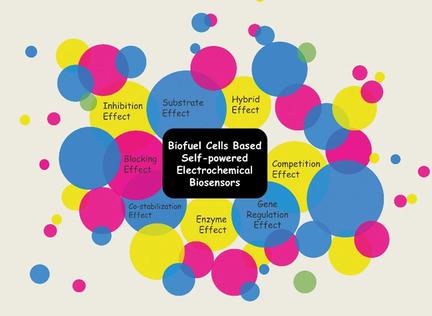当前位置:
X-MOL 学术
›
Electroanalysis
›
论文详情
Our official English website, www.x-mol.net, welcomes your feedback! (Note: you will need to create a separate account there.)
Recent Advances in the Construction of Biofuel Cells Based Self‐powered Electrochemical Biosensors: A Review
Electroanalysis ( IF 3 ) Pub Date : 2018-09-14 , DOI: 10.1002/elan.201800487 Liangying Fu 1 , Jingju Liu 1 , Zongqian Hu 2 , Ming Zhou 1
Electroanalysis ( IF 3 ) Pub Date : 2018-09-14 , DOI: 10.1002/elan.201800487 Liangying Fu 1 , Jingju Liu 1 , Zongqian Hu 2 , Ming Zhou 1
Affiliation

|
The application of biofuel cells (BFCs) for the construction of self‐powered electrochemical biosensors has recently received enormous attention with exciting advancements. The principle of BFCs for electrochemical biosensing is that the BFCs’ power output which is directly extracted by the biological reactions with the help of biocatalysts is closely related to the analyte's concentration. Such unique feature makes BFCs based electrochemical biosensors with two‐electrode system to be operated without the need of any external power source, which provides a more effective way for the miniaturization and convenient construction of electrochemical biosensors than the traditional electrochemical biosensors with three‐electrode system. Following our previous reviews (Electroanalysis 2012, 24, 197–209; Electroanalysis 2015, 27, 1786–1801), the current review is focused on the recent development and advances in the construction of BFCs based self‐powered electrochemical biosensors which are reported in the years between 2015 and 2018, with a particular emphasis on their possible practical applications in the fields of medical diagnosis, environmental monitoring, food analysis and wearable devices. For these reported BFCs‐based self‐powered electrochemical biosensors, the design approaches are still within the scope of effects (i.e., substrate, inhibition, blocking, gene regulation, enzyme, co‐stabilization, competition, and hybrid effects) summarized by our previous reviews. The outlook, challenges and developing tendency of the future research for the construction of BFCs based self‐powered electrochemical biosensor are discussed in the end. We expect that the advanced electrochemical biosensors based on BFCs with the unique self‐powered capability will continue attracting increasing research interest and lead to new opportunities in various attractive applications related to analytical chemistry.
中文翻译:

基于生物燃料电池的自供电电化学生物传感器的最新进展:综述
生物燃料电池(BFC)在自供电电化学生物传感器的构造中的应用近来受到了令人瞩目的进展,并取得了令人兴奋的进展。BFCs用于电化学生物传感的原理是,通过生物反应在生物催化剂的帮助下直接提取的BFC的功率输出与分析物的浓度密切相关。这种独特的功能使基于BFCs的双电极系统电化学生物传感器无需任何外部电源即可运行,与传统的三电极系统电化学生物传感器相比,它为电化学生物传感器的小型化和便捷构造提供了更有效的方法。遵循我们之前的评论(Electroanalysis 2012,24,197–209; Electroanalysis 2015,27,1786–1801),当前的审查侧重于基于BFCs的自供电式电化学生物传感器的最新发展和建设进展,据报道,2015年至2018年之间,特别是其在医学诊断,环境领域的可能实际应用监控,食品分析和可穿戴设备。对于这些已报道的基于BFC的自供电电化学生物传感器,设计方法仍在我们先前总结的影响范围内(即底物,抑制,阻断,基因调控,酶,共稳定,竞争和混合效应)。评论。最后讨论了基于BFCs的自供电电化学生物传感器的未来研究前景,挑战和发展趋势。
更新日期:2018-09-14
中文翻译:

基于生物燃料电池的自供电电化学生物传感器的最新进展:综述
生物燃料电池(BFC)在自供电电化学生物传感器的构造中的应用近来受到了令人瞩目的进展,并取得了令人兴奋的进展。BFCs用于电化学生物传感的原理是,通过生物反应在生物催化剂的帮助下直接提取的BFC的功率输出与分析物的浓度密切相关。这种独特的功能使基于BFCs的双电极系统电化学生物传感器无需任何外部电源即可运行,与传统的三电极系统电化学生物传感器相比,它为电化学生物传感器的小型化和便捷构造提供了更有效的方法。遵循我们之前的评论(Electroanalysis 2012,24,197–209; Electroanalysis 2015,27,1786–1801),当前的审查侧重于基于BFCs的自供电式电化学生物传感器的最新发展和建设进展,据报道,2015年至2018年之间,特别是其在医学诊断,环境领域的可能实际应用监控,食品分析和可穿戴设备。对于这些已报道的基于BFC的自供电电化学生物传感器,设计方法仍在我们先前总结的影响范围内(即底物,抑制,阻断,基因调控,酶,共稳定,竞争和混合效应)。评论。最后讨论了基于BFCs的自供电电化学生物传感器的未来研究前景,挑战和发展趋势。



























 京公网安备 11010802027423号
京公网安备 11010802027423号